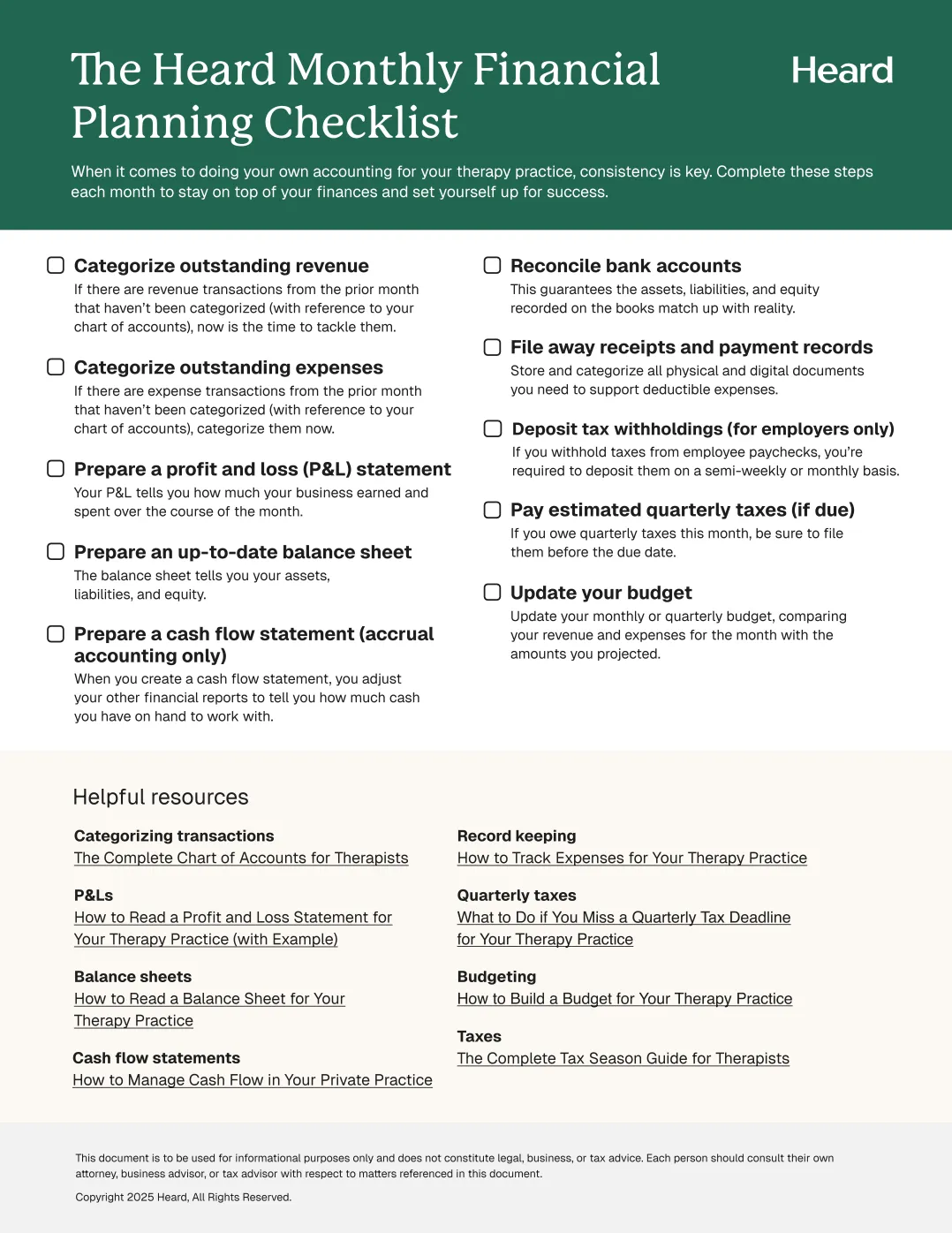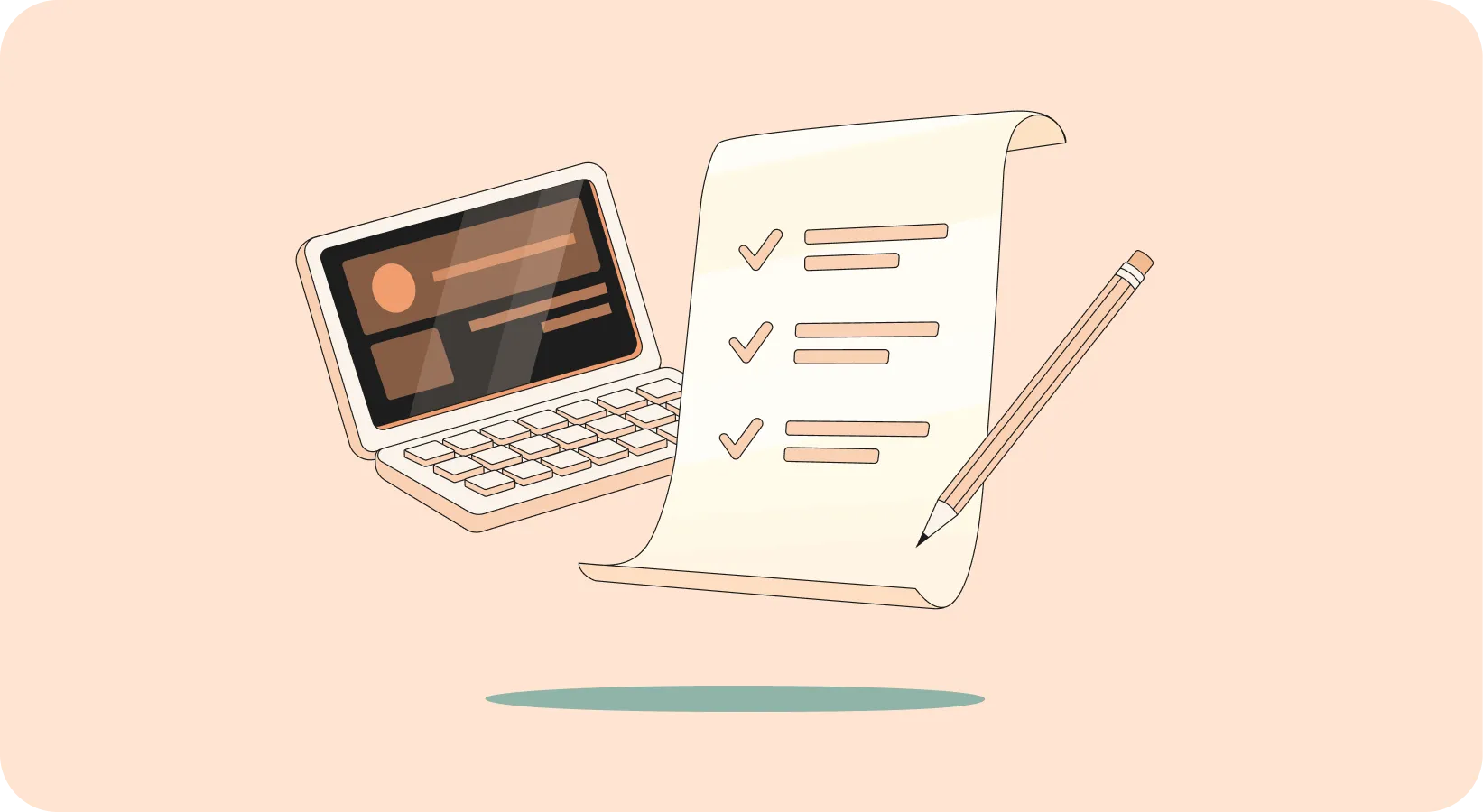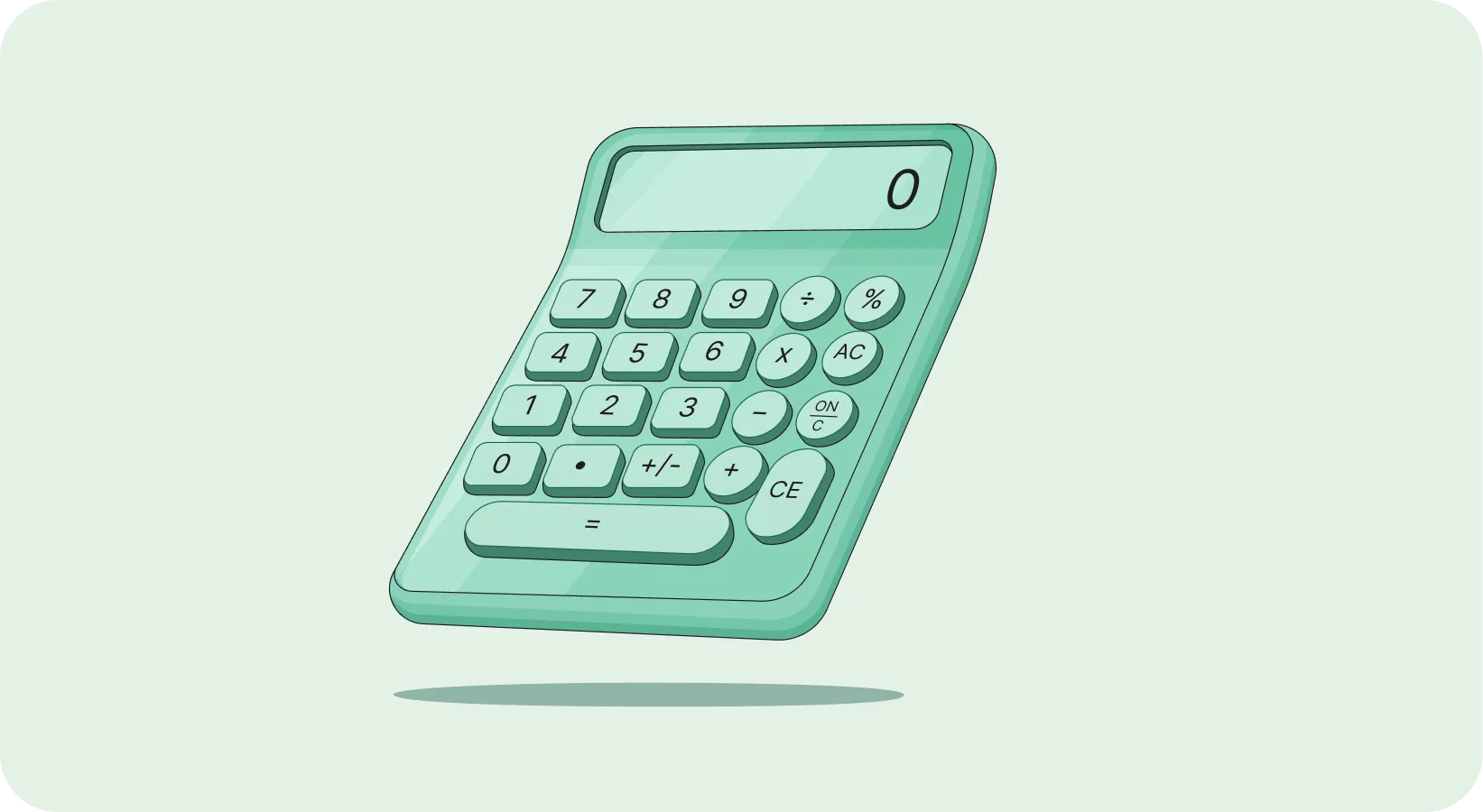When you’re a self-employed therapist, upgrading your financial literacy is one of the best things you can do to build a resilient practice and de-stress your work life.
Financial literacy isn’t only about managing money well. It’s also about having the knowledge you need to make informed decisions when it comes to both your personal and your business finances. That kind of knowledge is empowering.
Here’s what every therapist needs to know about financial literacy.
{{resource}}
What is financial literacy?
Simply put, financial literacy is the measure of how well you understand financial matters. Basic financial literacy includes knowing how to set a budget, manage your bank accounts, save for the future, and maintain a good credit score.
More advanced financial literacy may include managing debt, making secure long-term investments (for instance, retirement savings), and comparing different financial tools (for instance, a personal loan versus a line of credit).
That covers personal finances. When you run your own therapy practice, you need to expand your financial literacy to include basic bookkeeping, business taxes and tax deductions, financial reports, and your practice’s budget.
The good news is that you don’t need to go back to school or hire a tutor to achieve financial literacy. You can learn on your own, at your own pace, and immediately apply what you learn to your personal and business finances.
If you’re reading this article, you’ve already taken steps toward improving your financial literacy as a therapist.
Financial literacy isn't just knowing what to do with money but actually doing it. — Jacent Wamala, M.S., LMFT
Why is financial literacy important for therapists?
Your personal finances are one thing. When you’re also responsible for the finances of your practice, the stakes go up. Here are some of the main reasons self-employed therapists should take financial literacy seriously.
It prevents costly mistakes
Possibly the number one reason to upgrade your financial literacy is the fact that it can save you from making costly mistakes.
For instance, many therapists who first go into private practice for themselves fail to set aside enough of their income to cover taxes, either because they don’t know how to do so or because they neglect to take into account self-employment tax. That leads to unpaid tax bills and extra charges from the IRS.
Other mistakes are larger-scale and more complex. Hiring staff, renting office space, or restructuring your fees all have long-term effects on your finances that are impossible to predict without making financial projections. If you don’t know how to create financial projections—or if you aren’t even aware you need to use them—then every major business move is a shot in the dark.
It prepares you for emergencies
A good savings plan for you and your therapy practice can protect you both from sudden shortfalls.
But to save effectively you need to create budgets—both a budget for your practice, and a budget for yourself—and that requires financial literacy.
Beyond having savings set aside, you also need to understand the impact of unforeseen events. If your monthly income takes a nosedive, if your office rent is suddenly hiked, if you’re forced to take time off work—how does that impact your finances overall? Financial literacy helps you stay flexible and prepared to react to changing situations.
It improves your work-life balance
If your financial literacy is low, you could end up doing more work than you need to.
Bookkeeping is simpler when, rather than using a makeshift spreadsheet, you adopt a bookkeeping system or hire a professional. Monthly budgets take less time to manage when you follow tried and true budgeting methods. And tax season is less of a burden when you have a full set of financial reports for the year.
Looking at it this way, improving your financial literacy isn’t just another task to add to your already-packed schedule—it’s the key to freeing up more time so you can balance your work life and your personal life.
It helps you meet professional goals
Whether you’re dead set on becoming the owner of a thriving group practice, planning to go back to school to upgrade your education, or taking the first steps towards starting your own practice, financial literacy helps you to achieve your goals.
It’s hard to expand your practice if you can’t create financial projections. Returning to school is a costly burden if you don’t know how to manage debt. And starting your own practice is daunting if you’re unable to create a budget and set aside savings for startup costs.
Whatever type of career you want to build, financial literacy is an important ingredient.
We don't know what the future holds. And we all have a past. But with financial literacy, you can begin to shape your financial future, reaching the goals you have for life—not just finances. — Ryan Derousseau, CFP, EA, Thinking Cap Financial
It makes you more confident
The better you know how to do something, the more confident you are doing it. That applies to everything from treating clients in a clinical setting to balancing your budget. Knowledge and experience are the keys to confidence.
Your education and your hours under supervision have given you the tools you need to feel confident treating clients. But they probably didn’t give you the tools you need to feel confident balancing your budget.
When you improve your financial literacy, you’re more confident when it comes to managing your finances. That’s empowering—and it makes managing your money less a source of anxiety than a job you can take pride in.
It helps you avoid burnout
Financial stress and uneven work-life balance are major contributors to burnout in self-employed therapists.
Financial literacy combats both. When you understand how your money works—and how to make it work for you—you have more room to breathe. That improves your longevity as a therapist and your happiness overall.
Therapists deserve the peace of mind financial literacy provides, and it makes their work sustainable so that they can effectively serve for as long as they want instead of having to supplement or leave the field because they literally can't afford it. — Jacent Wamala, M.S., LMFT
It benefits your clients
No matter how amazing you are as a therapist, if your therapy practice can’t pay its bills, your clients will suffer for it.
After all, in order to practice you need to stay in practice. And in order for clients to benefit from your hard work as a therapist, they need you to keep practicing.
Many therapists downplay or neglect financial matters because they believe helping clients should be their number one priority. But your personal and professional financial stability directly impact your ability to help others. If you’re not taking your finances seriously, then your plan to help others is missing a vital part. Prioritizing your financial literacy now can help you better serve clients in the future.
Financial literacy and the application of financial principles can support therapists in running sustainable private practices long term, which benefits both them and their clients. — Jillian Knight, LMFT
{{resource}}
Financial literacy basics for therapists
These are the most important building blocks of financial literacy for self-employed therapists that can help you to manage both your personal and professional finances. Each of these topics is covered in detail in the Heard Resource Hub.
Budgeting
Budgeting consists of allocating funds to pay for expenses, and anticipating the income you will earn that allows you to do so. But beyond that, you should also be prepared to choose a budgeting method, update your budget regularly (compare your actual expenses/revenue with your projected expenses/revenue), and make cuts to expenses where necessary. It’s a good idea to build both a business and personal budget to follow.
From the Resource Hub:
- The Complete Budgeting Guide for Therapists
- How to Build a Budget for Your Therapy Practice
- Budget Template for Therapists
Debt management
Debt management is about keeping your debt under control, choosing which debts to prioritize paying off, and if necessary restructuring your debt to make it easier to pay. But it’s also about making informed decisions about which debts to take on, and how to use them beneficially in both your personal and business finances.
From the Resource Hub:
- How to Pay Off Debt: A Complete Guide for Therapists
- How I Paid Off $94,000 in Debt in 3 Years as a Marriage and Family Therapist
- How I Paid Off $83,000 in Debt as a Social Worker and Single Woman
Credit
Credit refers to both money you’re able to borrow (with credit cards, lines of credit, loans, etc.) and to your overall creditworthiness. That includes your credit report and a credit rating. Before you take on any new debt for either yourself or your therapy practice—and particularly if you plan to take on personal debt to cover business expenses—you should make sure you have a solid foundation in how credit works.
From the Resource Hub:
- The Complete Guide to Credit for Therapists
- The Complete Guide to Loans for Therapists
- How to Choose a Business Credit Card for Your Therapy Practice
Savings
Savings includes money kept in savings accounts in case of emergencies, or saved up to make major purchases. But it also includes long-term savings, like retirement funds. Different types of long-term savings funds are treated differently for tax purposes, and they may include assets besides cash.
From the Resource Hub:
Taxes and tax filing
Whether you file your taxes yourself or you hire a professional to do it for you, you should aim to have a basic understanding of how both your personal and your business taxes work. If you’re a sole proprietor (see “Business entities”, below) then you and your business are identical for tax purposes—so it’s even more important to understand how your income and deductible expenses are reported. Also, when you’re self-employed, you’re required to pay your own taxes, which means calculating how much to set aside.
From the Resource Hub:
Tax deductions
There are two types of tax deductions to concern yourself with as a business owner: so-called “above the line” deductions on your personal return (which take either the form of the standard deduction or of itemized deductions); and deductible business expenses (which you report on Schedule C of your personal return if you’re a sole proprietor). Taking advantage of tax deductions is the number one way to lower your tax bill, but first you need to understand what’s deductible—and what’s not.
From the Resource Hub:
- The Complete List of Tax Deductions for Therapists
- How to Determine If Something is a Tax Deduction for Therapists (with Examples)
- Is Going to Therapy Tax Deductible?
Business entities
Different business entities are treated differently for tax purposes. If you elect to become a limited liability company (LLC), you not only reduce your personal financial and legal liability as a business owner, but you give yourself the chance to elect to file as different types of entities. Understanding how business entities differ can help you plan how to restructure your practice in the future and possibly enjoy tax benefits.
From the Resource Hub:
- The Complete Guide to LLCs and PLLCs for Therapists
- How to Choose a Business Entity for Your Therapy Practice
- What Therapists Need to Know About Liability
Outsourcing (bookkeepers and accountants)
Almost as important as knowing how to manage your personal finances is understanding when to hire a professional to manage them for you. Depending on the size and complexity of your practice, you may end up saving time and money by outsourcing your back office tasks. The most important financial professionals in your business life are your bookkeeper, who tracks day-to-day financial activities, and your accountant, who files your taxes and helps with long-term financial planning.
From the Resource Hub:
- What Does a Bookkeeper Actually Do?
- The Difference Between an Accountant, Bookkeeper, CPA, and EA for Therapists
- When to Hire a Bookkeeper for Your Therapy Practice
Financial planning
Financial planning is important for both your personal and your business finances. It involves anticipating your revenue and expenses, setting goals, and making decisions about how you will use your money. To do this for your practice, you need to be able to read financial reports: even if you hire an accountant to help you with financial planning, it helps to have some grasp of the most important data.
From the Resource Hub:
- The Complete Guide to Financial Planning for Therapists
- Year-End Financial Planning for Therapists
- How to Build a Profitable Therapy Practice
Bookkeeping concepts
Bookkeeping is the day-to-day task of tracking what your practice earns and spends. You use the data collected with bookkeeping to generate financial reports, make informed business decisions, and file your taxes after the end of the year. When your practice is just starting out, you may do your own bookkeeping rather than hiring a professional. For that, you should aim to have a basic grounding in key bookkeeping concepts.
From the Resource Hub:
- The Complete Guide to Bookkeeping for Therapists
- The Glossary of Bookkeeping and Tax Terms for Therapists
- How to Set Up a Chart of Accounts for Your Therapy Practice (with Example)
Recordkeeping
Any tax deductions your practice claims need to be backed up by receipts. Besides that, you should aim to store other financial data—like bookkeeping ledgers and tax returns—in a way that makes them easy to retrieve. These can help you out in case of an audit, or in case you need to provide records to a third party—like a lender, an investor, or someone interested in buying your business.
From the Resource Hub:
{{resource}}
Key takeaways
- Financial literacy for self-employed therapists means understanding both how your professional and your personal finances work
- Improving your financial literacy can help you build a more resilient practice, improve your work-life balance, and better serve your clients
- You can upgrade your financial literacy with help from the Heard Resource Hub, which is designed specifically for self-employed therapists
—
Interested in improving your financial literacy? Check out our complete guide to budgeting for therapists.
This post is to be used for informational purposes only and does not constitute legal, business, or tax advice. Each person should consult their own attorney, business advisor, or tax advisor with respect to matters referenced in this post.
Bryce Warnes is a West Coast writer specializing in small business finances.
{{cta}}
Manage your bookkeeping, taxes, and payroll—all in one place.

Discover more. Get our newsletter.
Get free articles, guides, and tools developed by our experts to help you understand and manage your private practice finances.





